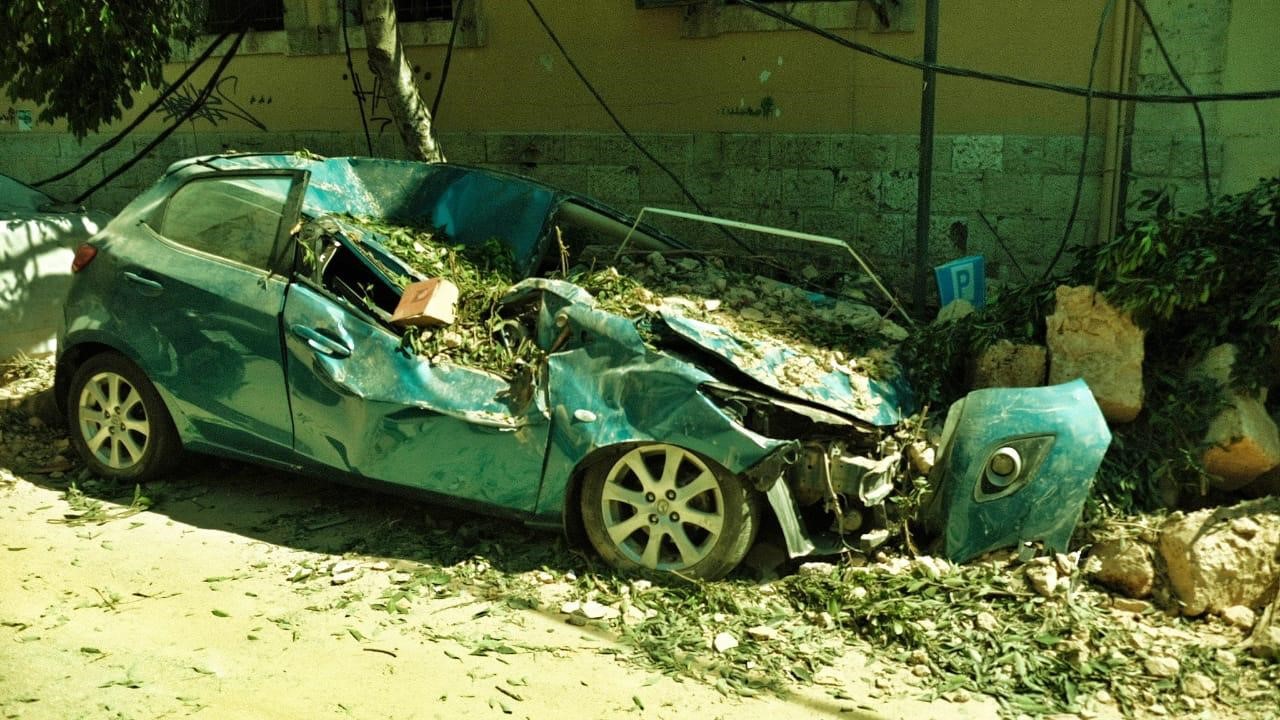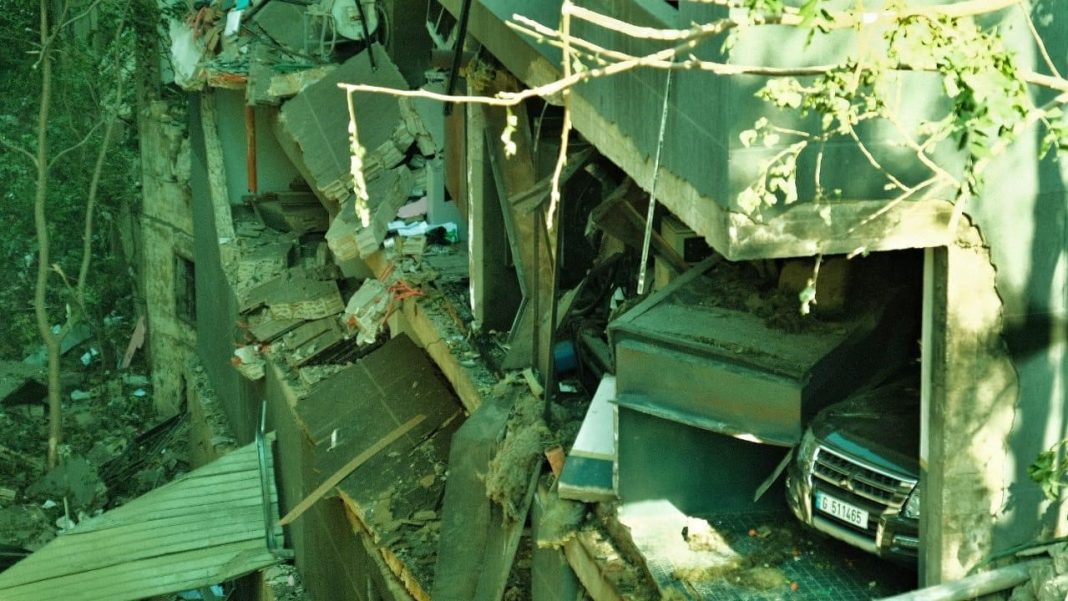On 4 August, there was an explosion in the heart of Beirut: But can the aftermath permanently change the future of Lebanon?
On the morning of 4 August, a destructive force rippled through the city of Beirut. The blast happened at the docks, but the impact was visible in the outskirts of the city. The sound travelled across borders, to Cyprus, Israel, and Syria. Bomb experts at University of Sheffield called it “one of the biggest non-nuclear explosions in history”, with one tenth of the energy seen 75 years ago in Hiroshima.
Firstly: Why did this happen?
The death toll currently stands at 158 people, with over 6,000 injured. Lebanese officials confirmed that 2750 tonnes of ammonium nitrate caused the chemical blast. According to a Lebanese official, the chemical was insecurely stored at the docks since 2014. President Auon admits to knowing about the warehouse since early June this year.
The source of ignition is unknown, but there is plenty of visual information: People in a daze filmed blood-stained streets, orange mushroom clouds that belong in CGI studios and offices transformed into rooms of broken glass. The evidence of an unforgivable failure is everywhere, whilst the answers are elusive.
Many building structures are now precarious, their continued existence depending on the mercy of gravity and State intervention that does not come. The latest count shows that 300,000 people have lost their homes. Even before COVID-19 and a neglected warehouse of chemicals, the world bank predicted that 45% of people would be under the poverty line in 2020. The grain silo caught in the blast has no backup, pushing food security to the forefront of public concern. Questionable access to drinking water and medical supplies contributes to make this moment the worst economic disaster that Lebanon has experienced since the Civil War of 1975-1990.

The Governor of Beirut, Marwan Abboud, compared the scene to Hiroshima before academics at Sheffield had a chance to. He said: “We don’t know how we are going to recover. We don’t know. We could barely survive before and now we have this.”
‘My mum said it was a very bad storm’
Ali Khalil*, a seven-year-old boy sitting in a classroom on Tuesday morning, does not remember much. His dad did not take him the normal route past the port that day, which he will remember for a long time. Speaking about it a few days later, he is still confused about what happened to cause the “big bang” that he heard at school or what it means – his youth has protected him from the heaviness of conscious fear.
“My teacher came in and told us to calm down and everyone was screaming. I didn’t know what to do, I just started laughing at random and running around…that’s all I remember…
“My dad came and picked me up and told me that today he was supposed to pass the port, but he didn’t take that route. My mum said it was a very bad storm.”
‘She ran out […] to rescue my daughter’
Omar* was working out of the city on Tuesday due to a last-minute meeting, but his wife and daughter remained in central Beirut. Whilst he escaped the immediacy of the blast, he came home to the lasting mental and material consequences. He describes scenes faced by his partner, which will form a dark, collective memory for the hundreds who made similar post-blast commutes across the city.
“My wife was at the Aishti department store in downtown Beirut, when the explosion happened. It was badly damaged, and many were injured. She ran out and she had to walk, between people injured and dead on the streets, to go home in Achrafieh about 1km away, to rescue my daughter.
“I was lucky to leave the house and drive north of Beirut, 2 hours before the explosion.”
Secondly: How can we help?
Two hospitals were in the blast radius and both were already struggling to handle COVID-19 patients. Staff and patients experienced newfound desperation as windows crashed in around them, completely without warning.
Human Rights Watch observed medical staff at the Saint George University Hospital treating patients in their carpark, using their mobile phones for light. When this makeshift-emergency room got overwhelmed with the numbers, patients had to be transported over 70km away, to Nabatieh and Tripoli.
More phones were lighting up, over 4000km away in London. With goosebumps, Dima Rizk ran into her sisters’ room, where both siblings watched the situation unfold in fragmented real-time:
“Mary, the Internet is wild, this can’t be real!”
“But then I received more videos – different angles, from different people, within a number of minutes…it was confirmed true. A tragedy had occurred.”
The disbelief was replaced by realisation, faster than sunlight travels to the Earth. Commenting to the NYT about the Saint George University Hospital, Dr Joseph Haddad, director of intensive care, said:
“There is no St. George Hospital anymore. It’s fallen, it’s on the floor [ …] It’s all destroyed. All of it.”
While the infrastructure of the hospital is deeply damaged, the support coming from the Lebanese diaspora to the homeland is only rising. The diaspora is anywhere between 4 – 8 million strong, twice the 4 million population of Lebanon itself.
Navigating the corruption problem
Sisters Dima and Mary live in London, remaining digitally connected to friends and family who live in Beirut. This instinctive love exists outside of borders, currencies, and language – but supplements those things when it must, when there is nothing else but an indifferent Government. Remittances sent back to Lebanon amounted to 18% of the economy in 2014, which was roughly $8.9 billion.
In the current crisis, this love translates into immediate aid.

Team DIMA Global is a fundraising organisation founded in 2016, by Dima and Mary. Dima explained that their fundraising work started in 2012, but they created an organisation a few years later because they wanted to anchor their work something larger than themselves: “We felt like we needed to create something.” Now, she says that it is time to use their resources to help Lebanese people, not sit out and watch other people do the work:
“We are aware that there are initiatives in place, and we know people have already donated, which we admire, considering the circumstances [COVID-19]. However, we want to do our bit. We stand out because we want to distribute food and hopefully ship medication.
Team DIMA Global are making food accessible to those facing starvation in Beirut, via the ‘You Can Help’ scheme – raising £2,750 over the last 4 days. The goal is £5000, which is becoming more possible with every passing hour.
The Government is not involved in these ongoing donations. Misuse of funds is an increasing fear for the €250 million aid package created by 15 government leaders at a donor summit led by President Macron of France. Lebanon defaulted on its debts in March 2020, and the State’s response was to fire several Cabinet members who criticised the bad governance that led to this debt failure.
Whilst the foreign aid comes with a condition of meaningful political reform, it is still a belief held by Lebanese everywhere, that these ideological conditions will not entirely protect the money from being drained away by corrupt individuals. In light of this knowledge, the funds coming from grassroots organisations like The Lebanese Red Cross and Team DIMA Global are never compromised by Government interference, as the organisation directly works with impacted communities.
This money passes through the world like an underground train, seen only by the people who are using it.
Finally: Will this explosion permanently change Lebanon?
In the October Revolution of 2019-2020, protesters took to the streets for essentially the same failures – a lack of accountability from politicians, failed electricity, water and sanitation, an increasingly limp economy and unemployment that reached 46% in 2018, to name a few. Protesters filled the streets on 8 August, searching for answers from their leaders to explain why lives and worlds were left to chance for six years, as a chemical bomb lived in the busy docks of Beirut.

The Lebanese Red Cross documented that rubber bullets were fired into the crowd by law enforcement, alongside tear gas and other hostile uses of force. The Red Cross took 63 individuals to nearby hospitals for care, whilst treating 175 injured civilians at the scene on 8 August. Whilst President Macron promised Lebanese crowds a second visit to monitor political reform in September, pushing other countries to engage in the same dialogue – the impact of this public encouragement on the Lebanese Government is yet to be seen.
We spoke to Dr Jacob Eriksson, specialist in West-Asian conflict at University of York, about the possibilities of change ahead. He described the blast as a “reflection” of the deep-rooted political mismanagement that has been ongoing for decades.
He further explained:
“With the Lebanese economy already on the verge of collapse prior to the COVID-19 pandemic lockdown, this will strengthen the pre-existing protest movement calling for a revolution to end the corruption, nepotism, and sectarianism within the political system. A central grievance has been the lack of accountability for political elites, so accountability for the port explosion will be a critical test for any future government.
“How this new government will be formed, however, remains unclear given the failures of the existing system, but a transitional technocratic government to oversee the process would be a positive development.
“Protesters are calling for structural change through a new electoral law and new elections with independent oversight, but this poses a challenge to the vested interests of powerful parties like Hezbollah. The international community must live up to President Macron’s promise to ensure that aid reaches the Lebanese people directly rather than being siphoned off by corrupt actors. On a political level, while external actors can pressure the government to reform, any structural political change has to come from the Lebanese themselves.”
We also spoke with Dr Indrajit Roy, Senior Lecturer in Global Development politics at the University of York. He has analysed the protests against Citizenship Amendment Act (CAA) in India and understands the nature of State injustice against its population.
He commented:
“This anger has spilled out on the streets, reminding the Lebanese government and people across the world that the Lebanese people demand to be recognised as citizens, and believe the government should be accountable to them. Although obviously specific to Lebanon, these are of a piece with protests world-wide against State injustice, whether it was BLM in the USA or the protests against the CAA in India earlier this year.
“Even as they draw on the rich history of protests in the country against State antipathy, the protests against State negligence reveal commonalities with popular anger against government injustice across the world in the present moment.”
People will continue to be angry, hurt and confused about how Lebanon got to this point in 2020, and it is currently unclear if even this is enough to catalyse the immense change required. What is clear in the wake of this tragedy, is that the diaspora will step in and support their communities – even where the Government is absent.
*Names have been changed to protect identities.











